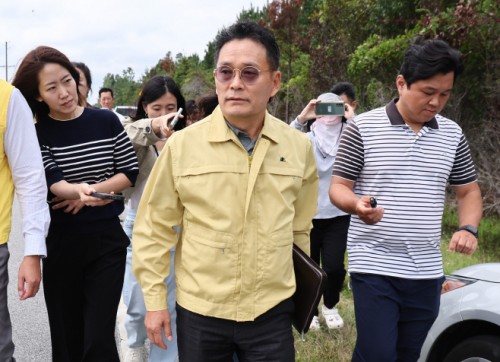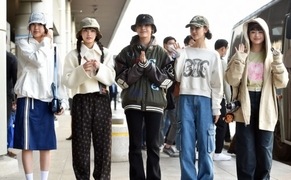 |
| Cho Ki-joong, consul general at the Embassy of the Republic of Korea in Washington, heads to the ICE detention facility in Folkston, Georgia, on September 8, where Korean battery-plant construction workers have been held following immigration raids. / Source: Yonhap News |
Korean nationals held at the U.S. Immigration and Customs Enforcement (ICE) detention facility in Folkston, Georgia, began departure procedures on September 8.
They could leave as early as September 10 on a Korean government charter, departing via Jacksonville International Airport in Florida, about a 50-minute drive from the facility.
Cho Ki-joong: “Interviews completed… departure process underway”
After visiting the Folkston facility on the morning of September 8, Cho Ki-joong, consul general at the Korean Embassy in Washington, told reporters he had met “everyone who wished to be seen, including group meetings,” and said the signing of departure consent forms would begin soon. He declined to disclose the numbers seeking voluntary departure or opting to remain, saying details would be provided at an appropriate time. Embassy officials in Washington also conducted additional interviews in the afternoon and started consent procedures.
Asked whether detainees could leave on the charter as soon as September 10, Cho said authorities were doing their best to enable a swift departure, noting the date remained fluid. Detainees are expected to be transported directly from the facility to the airport, rather than preparing for departure from hotels or other lodgings.
Voluntary departure to avoid future entry penalties
U.S. immigration authorities carried out a worksite operation on September 4 at a Korean battery-plant construction site in Ellabell, Georgia, detaining 475 people, including more than 300 Koreans. Men are being held at the Folkston facility and women at the Stewart facility. Seoul has pursued a deal with the Trump administration for the Koreans to return under voluntary departure, rather than formal removal, and talks have made progress.
On whether voluntary departure would trigger a five-year reentry bar, Cho said existing U.S. procedures indicate “there is no five-year entry ban for voluntary departure.” At a National Assembly hearing the same day, Foreign Minister Cho Hyun said Seoul and Washington had reached a “broad understanding” to prevent additional disadvantages for the workers going forward, adding that final confirmation was pending. He also said negotiations were proceeding “in a direction” that would avoid a five-year ban even if the outcome resembles expedited removal or de facto voluntary departure, while stressing that specific effects can vary by visa class or status.
Cho Hyun to Washington; specialty visas on agenda
Arriving late September 8 in Washington, D.C., Minister Cho is set to meet counterparts including Secretary of State Marco Rubio and Homeland Security Secretary Kristi Noem to finalize administrative steps for early repatriation. He is also expected to urge active White House support for congressional passage of the Partner with Korea Act, which would authorize up to 15,000 specialty-occupation work visas annually for qualified Korean nationals—an avenue supporters say could prevent recurrences of the current situation. Many of the detained reportedly entered on B-1/B-2 or ESTA and then worked at construction sites, which U.S. law does not permit.
President Donald Trump said he would review the request. “If we don’t have people in this country who know batteries, then we should help bring some of them in to train our people—whether it’s battery manufacturing, computer manufacturing, or shipbuilding—so Americans can do these complex jobs,” he said. “We need a plan to bring in experts to train our citizens so they can do it themselves, and I will review this because I fully understand what (Korea) has requested.”
Most Read
-
1
-
2
-
3
-
4
-
5
-
6
-
7





















